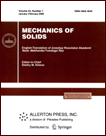 | | Mechanics of Solids
A Journal of Russian Academy of Sciences | | Founded
in January 1966
Issued 6 times a year
Print ISSN 0025-6544
Online ISSN 1934-7936 |
Archive of Issues
| Total articles in the database: | | 13427 |
| In Russian (Èçâ. ÐÀÍ. ÌÒÒ): | | 8178
|
| In English (Mech. Solids): | | 5249 |
|
| << Previous article | Volume 44, Issue 3 / 2009 | Next article >> |
| M. I. Chebakov, "To the theory of analysis of a two-layer cylindrical bearing," Mech. Solids. 44 (3), 473-479 (2009) |
| Year |
2009 |
Volume |
44 |
Number |
3 |
Pages |
473-479 |
| DOI |
10.3103/S0025654409030169 |
| Title |
To the theory of analysis of a two-layer cylindrical bearing |
| Author(s) |
M. I. Chebakov (Vorovich Research Institute of Mechanics and Applied Mathematics, South Federal University, pr-t Stachki 200/1, Rostov-on-Don, 344090 Russia, chebakov@math.rsu.ru) |
| Abstract |
We consider the plane contact problem of elasticity concerning the interaction between an absolutely rigid cylinder and the internal cylindrical surface of the cylindrical base, which consists of two circular cylindrical layers with different elastic constants. The base external surface is fixed, the layers are rigidly connected with each other, and the friction forces are absent in the contact region. Such problems sufficiently well model the operation of a composite cylindrical slider bearing, especially in the case of loads for which the angular dimension of the contact site is commensurable with the bearing width and the moduli of the insert liner and of the support are different and significantly less than the modulus of elasticity of the other details of the bearing.
For the above-stated problem of elasticity, we first construct integral equations, which are solved by the direct collocation method [1, 2] and by the asymptotic method [3, 4].
In contrast to the similar problems considered earlier (e.g., see [3, 4]) for a single-layer cylinder, the collocation method used here permits studying the problem practically for any parameter values. The asymptotic approach gives an efficient solution in the case of relatively thin layers in simple analytic form. We also compare the two solutions numerically and determine the scope of the asymptotic method. |
| References |
| 1. | V.V. Voronin and V.A. Tsetsokho,
"Numerical Solution, by Interpolation and Collocation, of Integral Equations of the 1st Kind with a Logarithmic Singularity,"
Zh. Vychisl. Mat. Mat. Fiz. 21 (1), 40-53 (1981)
[U.S.S.R. Comput. Math. Math. Phys. (Engl. Transl.)
21 (1), 38-52 (1981)]. |
| 2. | P.G. Ivanochkin, V.I. Kolesnikov, B.N. Flek, and M.I. Chebakov,
"Contact Strength of a Two-Layer Covering under Friction Forces in the Contact Region,"
Izv. Akad. Nauk. Mekh. Tverd. Tela, No. 1, 183-192 (2007)
[Mech. Solids (Engl. Transl.) 42 (1), 157-165 (2007)]. |
| 3. | V.M. Alexandrov and M.I. Chebakov,
Analytical Methods in Contact Problems in Theory of Elasticity
(Fizmatlit, Moscow, 2004) [in Russian]. |
| 4. | V.M. Alexandrov and M.I. Chebakov,
"On the Theory of Cylindrical Bearing Design,"
Izv. Akad. Nauk. Mekh. Tverd. Tela, No. 1, 22-30 (2004)
[Mech. Solids (Engl. Transl.) 39 (1), 14-20 (2004)]. |
| 5. | I.I. Vorovich, V.M. Alexandrov, and V.A. Babeshko,
Nonclassical Mixed Problems of Elasticity
(Nauka, Moscow, 1974) [in Russian]. |
| 6. | I.S. Gradshtein and I.M. Ryzhik,
Tables of Integrals, Sums, Series, and Products
(Nauka, Moscow, 1971) [in Russian]. |
|
| Received |
19 February 2007 |
| Link to Fulltext |
|
| << Previous article | Volume 44, Issue 3 / 2009 | Next article >> |
|
 If you find a misprint on a webpage, please help us correct it promptly - just highlight and press Ctrl+Enter If you find a misprint on a webpage, please help us correct it promptly - just highlight and press Ctrl+Enter
|
|

 Russian
Russian  English
English